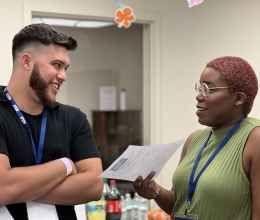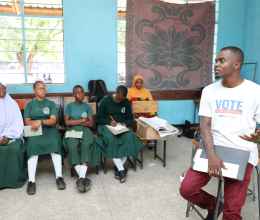
ACLU of Georgia’s Voter Access Project Fellow Evan Malbrough recalled Barack Obama’s famous quote, “A rising tide lifts all boats,” to convey how affirmative action was one tool used in equalizing outcomes for all people. Now that the Supreme Court has struck down the law, Evan reflects on how he benefited, and what hurdles he may face moving forward.
The legal decision is a major setback, but it’s not the end of efforts to open educational opportunities for people of color and others who benefit from affirmative action. Already, law firms and advocacy groups are monitoring the country’s post-affirmative action landscape. (The following interview has been edited for length).
What is your personal experience with affirmative action?
My experience with affirmative action has been long, and it's also been ongoing. In 2016, I was a college applicant, under the prior affirmative action system and was able to get into multiple universities that did take my race and background into account for admissions. Now, I find myself in 2023, a few months after the U.S. Supreme Court’s affirmative action ruling, and I'm applying to law school without those same protections. So in short, without those protections, I'm trying to progress into my graduate degree.
What was your immediate gut reaction to the Supreme Court’s ruling?
My immediate reaction was fear. I was expecting to apply to law school in a system that upheld affirmative action. Given that I’m applying to law school immediately after the ruling, it may make me the first admitted class of students after everything’s changed. It's the Wild Wild West, right? Currently, we know little about how schools will react, and what new policies they will put in place. Policies will get passed, court rulings will likely influence how the policies move forward. Prospective students don’t know how the changes will materialize when their applications cross an admissions desk. It leaves a lot of uncertainty.
What are your concerns now that this structural program has been taken away?
I have a lot of concerns. I believe that we may begin to silo off different perspectives and different backgrounds. If you look at the United States, in this country, most outcomes are decided by where you're from, and then what type of economic environment you were born into.
I was very lucky. I grew up in an environment where both of my parents worked, and they were gainfully employed. But, like a lot of other people of color, it was not easy. I went to public school and I didn’t get into a Magnet Program right away. I had to apply during my second year to be accepted, which was essential to making me competitive for college. With affirmative action being struck down, there is the possibility of a system where only those who have the resources to get into these institutions will be there. That creates an ever-widening class divide. I personally have no issue with public schools; I've only attended public schools. However, I understand that if there are certain jobs, if there are certain industries only recruiting from high-level schools, there's going to be a potential reduction in diversity at prestigious colleges and in the workforce. People who have a lot of power and capital in this society will not be reflective of the actual people who live in it.
What can schools, companies, nonprofits and other institutions do to circumvent the damages caused by the US Supreme Court’s affirmative action ruling?
Schools, in particular, should focus on pipeline programs. Even with affirmative action being struck down, schools have the ability and resources to establish such programs and opportunities for students who may not be eyeing the Ivy League or the top 20 colleges. This can be done with DEI (diversity, equity, and inclusion) programs. Those are now being banned in Florida, unfortunately, but not across the country.
One great example of allocating resources is the Harvard Debate Club. My cousin goes to public school in Atlanta and is a member of the school’s club. Being involved in the club could give him preferred admission into Harvard, an opportunity that he possibly would not have received otherwise. It creates a special door for people with diverse backgrounds.
Opening more of those doors is important. Businesses and other institutions need to step up. I was a part of a myriad of programs, one of which was INROADS, a DEI program that places diverse students in internships they wouldn't otherwise get. I worked three summers at the Pentagon, and through the program, I was able to present and rest on much more than simply my previous resume. I wouldn't have had the career I've had if I hadn’t gotten that chance. Even though I was young, even though I was Black, even though I wasn’t in a specific field, someone behind the program recognized my potential.
What were some of the shortcomings of affirmative action when still in practice?
When affirmative action was still in practice, there were a lot of shortcomings. Most concerning among them: while learning institutions took race-based admissions into consideration for adding students, it also did not circumvent the legacy admissions practices that are still active after the court’s ruling. So, while race was taken into account, there were still fewer spots available because those were reserved for students who had parents and family members who attended the university in the past.
How does affirmative action help all Americans? Why is diversity important for higher education institutions?
It helps all Americans because it gives consideration to all backgrounds. A narrow version of success excludes a lot of successful people. Barack Obama has the quote, “A rising tide lifts all boats.” A fair and equitable society doesn't take away from people who have privilege. Rather, it equalizes them. It may feel to some as if you're losing your privilege, but it's really not. I think having diverse classes (of people) allows young people to obtain the resources they need and the education they deserve. What we hope is that many of them will use those educations to create better outcomes for their communities. A larger number of thriving, prosperous communities is better for all people.
Should colleges and universities consider doing away with legacy admission in light of the decision?
Absolutely, because students who are legacy admissions already often have more resources. I’m not trying to discredit the actual merits of those prospective students. But, the fact of the matter is they have more means to live comfortably. A person who attends Harvard or Yale is not guaranteed to be a high-earner or guaranteed to be a millionaire. It just heavily increases their chances, especially compared to a person from a poorer background. Legacy students are already benefiting from a Harvard education, because they're being raised by someone who has just that. Universities and colleges should stop lowering barriers for people who have few resources to attain an Ivy league education.

